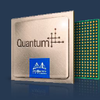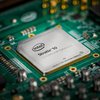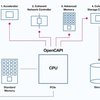Category – Feature Article
Although Intel had no blockbuster reveals at this years supercomputing conference (SC16), they did issue a flurry of announcements to remind everyone that they still dominate much of the componentry in the HPC industry. And if anything, they are looking to extend their hegemony, as well as move into new areas.
Just as the choice of processors architectures in supercomputing is expanding with GPUs, FPGAs, ARM and Power, memory is beginning to diversify as well. Novel technologies like 3D XPoint, resistive RAM/memristors, and 3D memory stacks are already starting to work their way into the hands of HPC users. At SC16 this week in Salt Lake City, one of the Friday panels, The Future of Memory Technology for Exascale and Beyond IV, will delve into this subject more deeply.
The rollout of200 Gbps networking began in earnest this week with Mellanoxs unveiling of its initial HDR InfiniBand portfolio of Quantum switches, ConnectX-6 adapters, and LinkX cables. Although none of the products will be available until 2017, the imminent move to 200 Gbps is set to leapfrog the competition, in particular, Intel, with its current 100 Gbps Omni-Path technology.
The prospect of FPGA-powered supercomputing has never looked brighter. The availability of more performant chips, the maturation of the OpenCL toolchain, the acquisition of Altera by Intel, and the worlds largest deployment of FPGAs in the datacenter by Microsoft, suggest that reconfigurable computing may finally fulfill its promise as a major technology for high performance computing.
In what seems paradoxical, a group of computer scientists have demonstrated that reducing the mathematical precision in a supercomputing computation can actually lead to more accurate solutions. The premise of the technique is to apply the energy savings reaped from lower precision calculations toward additional computation that will improve the quality of the results.
AI startup Graphcore has emerged from stealth mode with the announcement of $30 million in initial Series A funding. The Bristol, UK-based company will use the cash infusion to complete development of its Intelligent Processing Unit (IPU), a custom-built chip aimed at machine learning workloads. The funding was led by Robert Bosch Venture Capital GmbH and Samsung Catalyst Fund; also joining were Amadeus Capital Partners, C4 Ventures, Draper Esprit plc, Foundation Capital and Pitango Venture Capital.
The prospect of non-volatile DIMMs as an additional memory tier in the server is getting a lot more attention these days. The advent of novel memory technologies like 3D XPoint, resistive RAM/memristors, and NAND-based memory modules, in conjunction with market forces that are demanding much higher memory capacities, lower power usage, and in some cases, memory persistence, are conspiring to drive a new generation of NVDIMM products to market.
IT giant Fujitsu has been developing a series of in-house technologies aimed at the burgeoning market of artificial intelligence and machine learning. Although the company has made less fanfare of its ambitions in this regard than companies like IBM, Google and Microsoft, the Japanese multinational seems intent on expanding its datacenter business into this new high-value segment.
The commercialization of artificial intelligence over the last several years is now getting the attention of governments, which are starting to think about the policy implications presented by these new technologies. A recent report published by the White House attempts to address the challenges presented by AI, but skirts one very important issue.
IBM has unveiled OpenCAPI, an open-standard, high-speed bus interface for connecting devices in servers. The announcement coincides with the formation of a consortium of the same name that will manage the new standard, and which initially includes tech heavyweights Hewlett Packard Enterprise (HPE), Dell EMC, NVIDIA, Mellanox, Micron, Xilinx, and Google. The first OpenCAPI-supported devices and servers are expected to show up in 2017.










